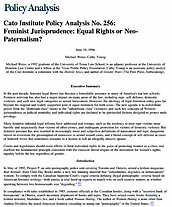In the past decade, feminist legal theory has become a formidable presence in many of America’s top law schools. Feminist activism has also had a major impact on many areas of the law, including rape, self-defense, domestic violence, and such new legal categories as sexual harassment. However, the ideology of legal feminism today goes far beyond the original and widely supported goal of equal treatment for both sexes. The new agenda is to redistribute power from the “dominant class” (men) to the “subordinate class” (women), and such key concepts of Western jurisprudence as judicial neutrality and individual rights are declared to be patriarchal fictions designed to protect male privilege.
Many feminist-initiated legal reforms have addressed real wrongs, such as the tendency to treat rape victims more harshly and suspiciously than victims of other crimes, and inadequate protection for victims of domestic violence. But feminist pressure has also resulted in increasingly loose and subjective definitions of harassment and rape, dangerous moves to eviscerate the presumption of innocence in sexual assault cases, and a broad concept of self-defense in cases of battered wives that sometimes amounts to a license to kill an allegedly abusive spouse.
Courts and legislatures should resist efforts to limit individual rights in the guise of protecting women as a class, and reaffirm the fundamental principle consistent with the classical liberal origins of the movement for women’s rights: equality before the law regardless of gender.
About the Authors

This work is licensed under a Creative Commons Attribution-NonCommercial-ShareAlike 4.0 International License.
